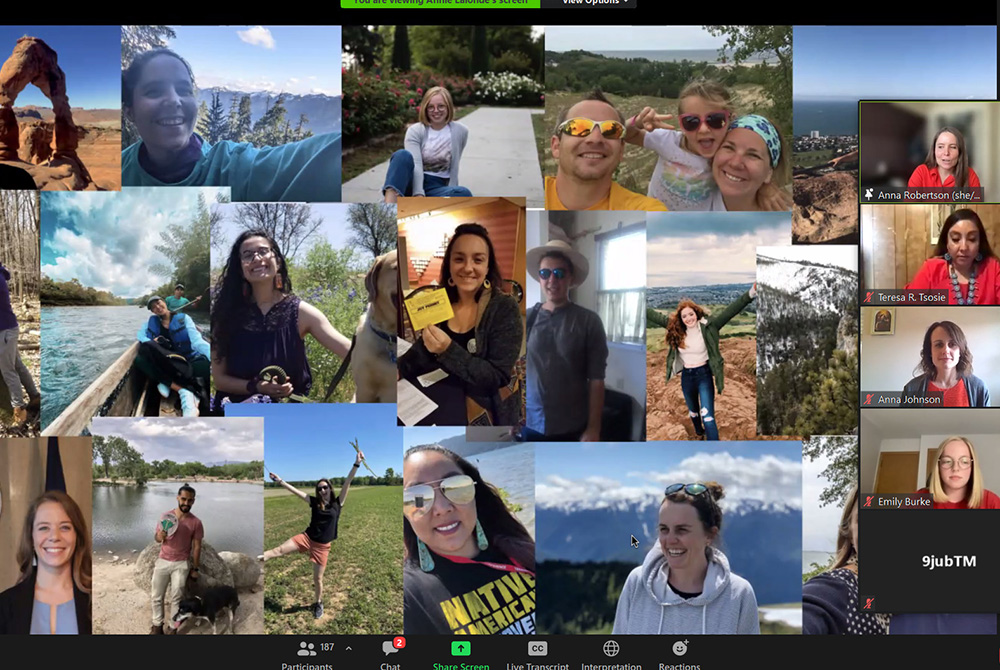
"We know that action is possible. And we want to take it. We might just not fully know how," said Anna Johnson, a leader of the young adult breakout session at the "Laudato Si' and the U.S. Catholic Church" conference on July 15. (NCR screenshot)
For three days in online spaces and forums, thousands of Catholics looked to prime the U.S. church for a fuller-throated response to climate change and Pope Francis' invitation to become a central component in the global response to the ecological challenges facing the world.
More than 2,600 people registered for the virtual "Laudato Si' and the U.S. Catholic Church" conference, the second of three co-organized by Catholic Climate Covenant and Creighton University to amplify the country's response to Francis' 2015 encyclical "Laudato Si', on Care for Our Common Home." The first gathering took place in 2019 on the Jesuit campus in Omaha, Nebraska, and the final is set for 2023.
Much of this middle conference, held July 13-15, was geared toward updates and preparations for the full release of the Vatican's Laudato Si' Action Platform in the fall. The ambitious project, developed by the Dicastery for Promoting Integral Human Development, invites church institutions large and small to commit to seven-year plans toward total sustainability, including becoming carbon neutral and expanding ecological education, in the spirit of Laudato Si'.
During the conference, Catholic Climate Covenant, which serves as the lead for U.S. implementation, debuted a new website, godsplanet.us, to coordinate and promote the country's involvement in the platform. The site has separate pages to track progress, access resources and provide examples for each of the action platform's seven church sectors.
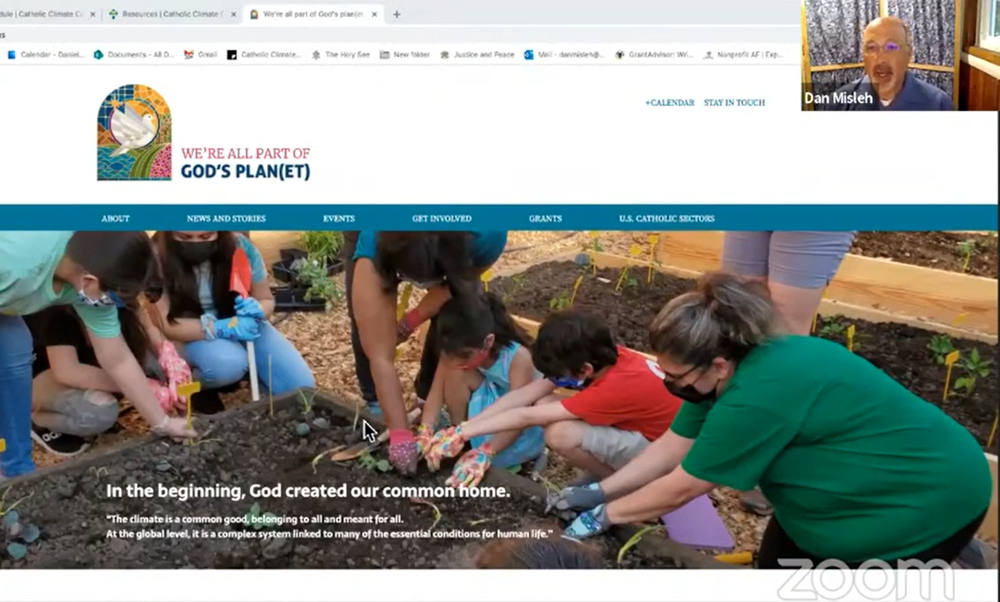
Catholic Climate Covenant executive director Dan Misleh displays a new website, godsplanet.us, to coordinate and promote U.S. efforts for the Vatican's Laudato Si' Action Platform. (NCR screenshot)
The website is part of the Covenant's new national Laudato Si' campaign to raise awareness about the platform, especially among Catholics who have not yet heard about it or who were initially uninterested in its message.
During an evening session July 14, representatives from the various Vatican-led working groups provided updates on what they've done and what to expect when the platform is fully released Oct. 4, the feast of St. Francis of Assisi.
Salesian Fr. Joshtrom Kureethadam, coordinator of ecology and creation at the dicastery, said in a prerecorded message that the Laudato Si' Action Platform represents the church's response to the cries of the earth, the poor and global youth. He said the strongest early response to the platform has come from the Philippines, with the U.S. among the top 10.
"We very much count on the leadership of the U.S. church," Kureethadam said.
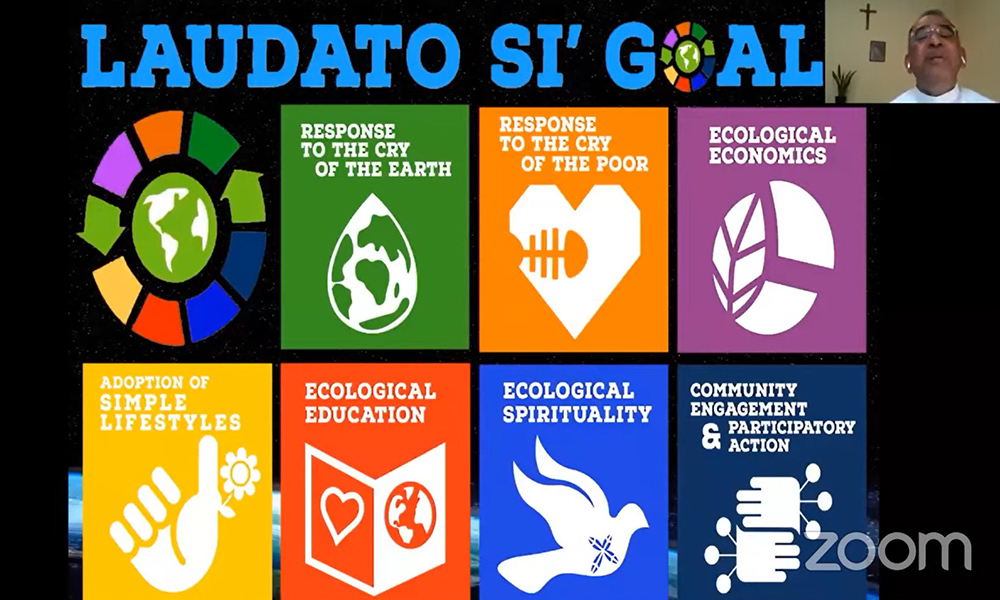
Salesian Fr. Joshtrom Kureethadam, head of the creation and ecology sector of the Vatican Dicastery for Promoting Integral Human Development, previews the Laudato Si' Action Platform during the "Laudato Si' and the U.S. Catholic Church" conference July 14. (NCR screenshot)
Later that night, the Covenant also announced a $120,000 small grants program to provide $1,000 grants for Catholic communities to undertake sustainability and climate justice projects. The grant program, launched with an initial $50,000 gift from the Our Lady of Victory Missionary Sisters, remains open for applications through Oct. 14.
In a separate effort to galvanize Catholic action, the Covenant organized two petition campaigns for Catholic individuals and institutions to urge President Joe Biden and Congress to move beyond partisanship and work together to enact legislation that drastically reduces the nation's greenhouse gas emissions, prioritizes the needs of those most vulnerable to climate change impacts and promotes an economic transition away from fossil fuels.
Jose Aguto, Catholic Climate Covenant's associate director, said the group hopes to deliver the petitions in person to government leaders during the Season of Creation (Sept. 1-Oct. 4), though that timeline may change should infrastructure legislation, which contains many of the president's climate proposals, move quickly through Congress.
Catholics called to environmental justice
The biennial conference began with an address by Chicago Cardinal Blase Cupich, who said a stronger embrace of Laudato Si' in the U.S. must include a rejection of the "idol of economic growth." It ended with Franciscan Sr. Ilia Delio delving into the insights offered by Jesuit Fr. Pierre Teilhard de Chardin for this current moment of ecological challenges.
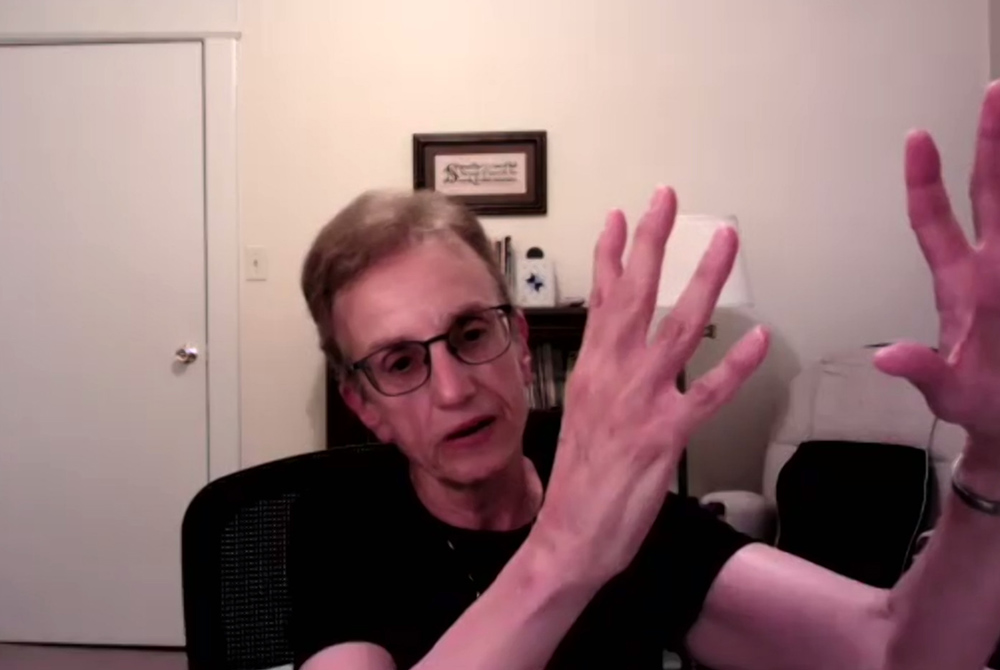
"Teilard de Chardin said we don't need so much a teaching church but a living church, and I think there's something to that. We have to live these ideals that we are espousing," Franciscan Sr. Ilia Delio said July 15 at the end of the "Laudato Si' and the U.S. Catholic Church" conference. (NCR screenshot)
"We are clearly an Earth in crisis," with a reversal necessary to secure a sustainable future, said Delio, a theologian at Villanova University. She said this moment is happening in a continually evolving and unfolding universe that is still unfinished. Delio posed a series of questions: about the relationship between religion and science; what Laudato Si', and Christianity more broadly, can offer ecological movements; and whether the concept of kinship or creation as family might better reflect humanity's place within nature than "care for creation."
"Teilard de Chardin said we don't need so much a teaching church but a living church, and I think there's something to that. We have to live these ideals that we are espousing," Delio said.
The majority of the three days focused on diving deeper into eight ministerial areas for implementing Laudato Si': advocacy, creation care teams, colleges and universities, parochial schools, preaching, communications and media, environmental justice, and youth and young adults.
Each session opened with prayer and a land acknowledgement of the Indigenous tribes that once lived where participants were located, as well as contrition for the role Christians have historically played in violence and colonization of native peoples. In a post-Mass reflection on St. Kateri Tekakwitha on her feast day, July 14, Bishop Joseph Tyson of Yakima, Washington, acknowledged the recent discovery of unmarked graves in Canada and the church's historical role in establishing residential schools that separated Indigenous children from their families.
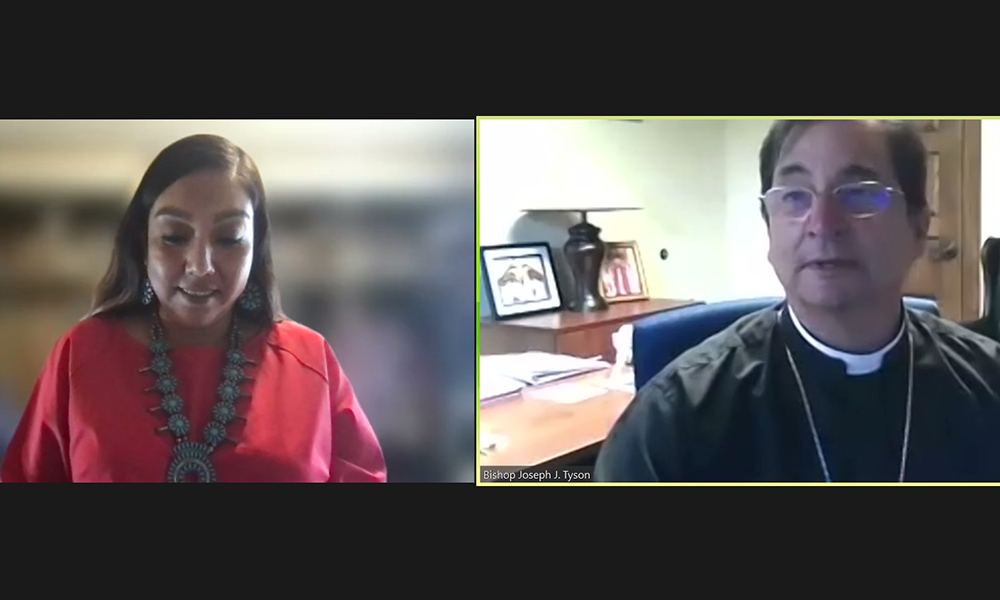
Bishop Joseph Tyson of Yakima, Washington, leads a reflection on St. Kateri Tekawitha on her feast day, July 14, during the "Laudato Si' and the U.S. Catholic Church" conference. Also pictured is Teresa Tsosie, a member of the Navajo Nation in Arizona. (NCR screenshot)
In a breakout session on environmental justice later that day, members of the Environmental Justice Project of Catholic Charities of the Diocese of Stockton, California — one of the few Catholic-affiliated environmental justice programs in the country — urged more Catholic organizations to form their own programs focused on environmental and climate justice. Aguto said the Covenant plans to hire someone focused on environmental justice in the coming months.
"We do have a very unique Catholic voice that we think should be part of the discussions" about zoning issues and water and air pollution affecting less fortunate parts of communities, said Ector Olivares, program manager of the Stockton Environmental Justice Project.
Participants also heard from two environmental justice leaders, Cheryl Johnson, executive director of the Chicago-based People for Community Recovery, and Sharon Lavigne, a recent Goldman Prize recipient and Catholic activist who continues to lead the fight against a plastics factory slated for her community in St. James Parish, Louisiana.
"We need more people to join and walk with us," Lavigne said, asking Catholics to join in urging Biden to go to St. James and to ultimately stop the factory.
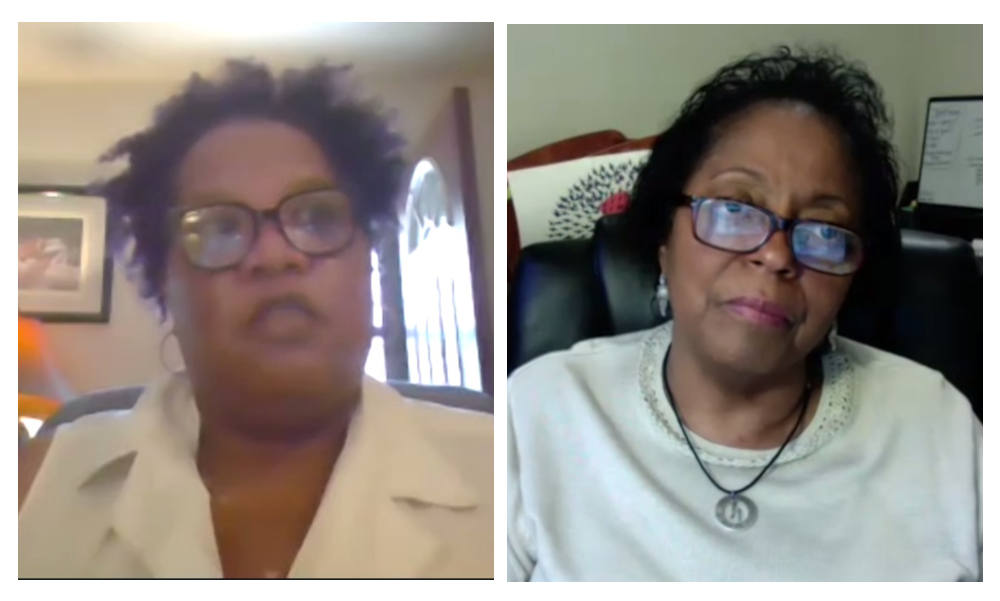
Cheryl Johnson, left, executive director of the Chicago-based People for Community Recovery, and Sharon Lavigne, founder of RISE St. James, each spoke during a session on environmental justice during the "Laudato Si' and the U.S. Catholic Church" conference July 14. (NCR screenshot)
Developing climate resources, strategies
Several sessions previewed projects in the works. Leaders in the communications group created a guidebook for Catholic communicators, with talking points, strategies and resources to engage key audiences around seven themes from Laudato Si'.
Sessions for universities and parochial schools offered ways to introduce the encyclical in academic programs. The young adult group introduced a first draft of a creation care curriculum for youth ministers, teachers and youth groups to use with young Catholics, with sections directed at spirituality, sustainability and simple living, and structural advocacy and social action.
The young adult and creation care team sessions also offered overviews of climate science from a University of Missouri student studying atmospheric and climate science and an astrophysicist who once headed NASA's public education area.
Philip Sakimoto, the former NASA official who now heads the University of Notre Dame's academic excellence program, said the science and increasing signs of climate change impacts make it clear that aggressive actions are needed now — "not in 10, 20, 30 years, now" — and that the Laudato Si' Action Platform can play an important role.
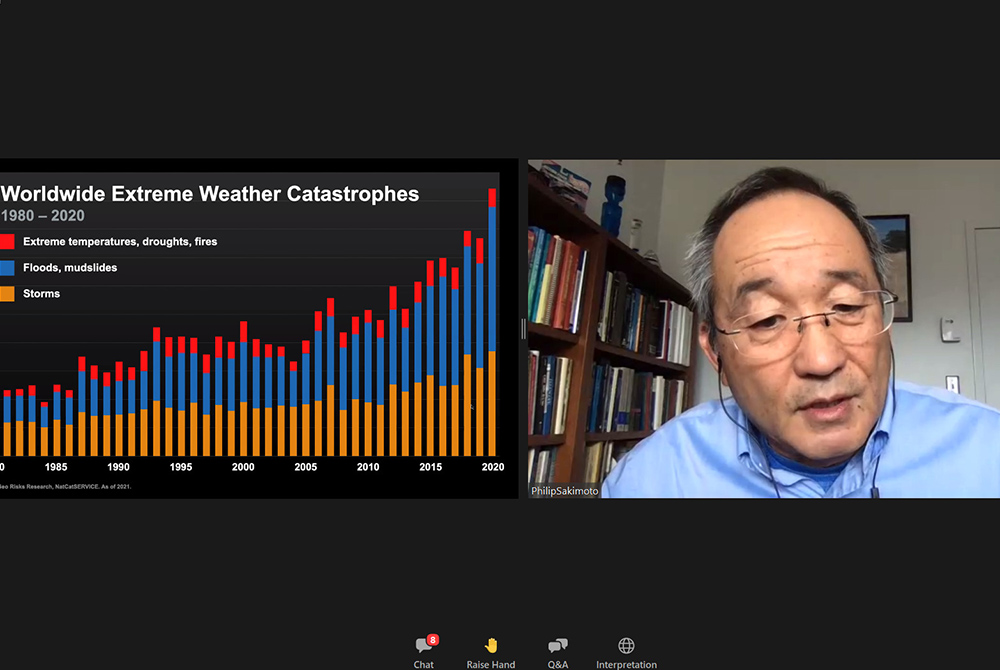
Philip Sakimoto, a past NASA official, explains the basics of climate science and the rise in extreme weather events in recent decades during the creation care team breakout session of the Laudato Si' conference July 15. (NCR screenshot)
"If we can move Catholics in every corner of the globe to become active and vocal about climate change, we could quite literally change the future of our planet," Sakimoto said (Sakimoto is a member of the EarthBeat advisory panel). "Concerned Catholics have the power to do that."
During their session, young adults expressed their worries and anxieties about climate change, which many called the biggest issue facing the world. In one exercise, participants flooded the chat box with accounts of the ways in which climate change has impacted their lives, including devastating heatwaves and wildfires in the western United States and February's deadly freeze in Texas.
Despite fears about the future, speakers held out hope that the church can be a substantial force for climate justice, even if some said it hasn't materialized yet.
"Quite honestly, we do not see the church collectively acting nearly quickly nor strategically enough on this issue, as she does with other issues, and we just don't get it," said Anna Johnson, a unit director for U.S. mission formation and young adult empowerment for the Maryknoll Fathers and Brothers.
"Quite honestly, we do not see the church collectively acting nearly quickly nor strategically enough on this issue, as she does with other issues, and we just don't get it."
—Anna Johnson
She said the church is uniquely positioned to be "a keystone species" in the fight for God's creation — "a species whose presence or absence has a dramatic effect on the ecosystem" — and she echoed Cupich's comments from the conference's first night, when he said young Catholics have untapped power to make that happen.
"We care deeply, and we want the church to do the same," Johnson said.
In the area of advocacy, Meghan Goodwin, associate director of government relations for the U.S. Conference of Catholic Bishops, said the conference has endorsed several climate-related bills during the current Congress, including the American Innovation and Competitiveness Act, the Trillion Trees Act, the Nonprofit Energy Efficiency Act and a bipartisan bill on carbon pricing.
In the coming days, she said, the conference plans to express support for legislation that would regulate perfluoroalkyl and polyfluoroalkyl substances — chemicals known as PFAS, which are used in many household items — as hazardous substances. The U.S. bishops' conference is also tracking environmental and just transition provisions in the infrastructure and reconciliation bills currently being negotiated in Congress.
Advertisement
God's invitation to something new
For all the brainstorming and momentum building, there was plenty of frustration expressed throughout the conference, too.
Participants shared experiences of environment-focused ministries being shut down or minimized in their dioceses. Others complained that their pastors won't talk about Laudato Si' at Mass or support creation care teams.
Session leaders offered ideas about how to engage priests and parishioners who are not yet on board with church teaching on the environment. Suggestions included emphasizing environmental teachings of Pope Emeritus Benedict XVI and Pope John Paul II in politically conservative areas, and finding allies in other parish programs and groups, or even outside the church.
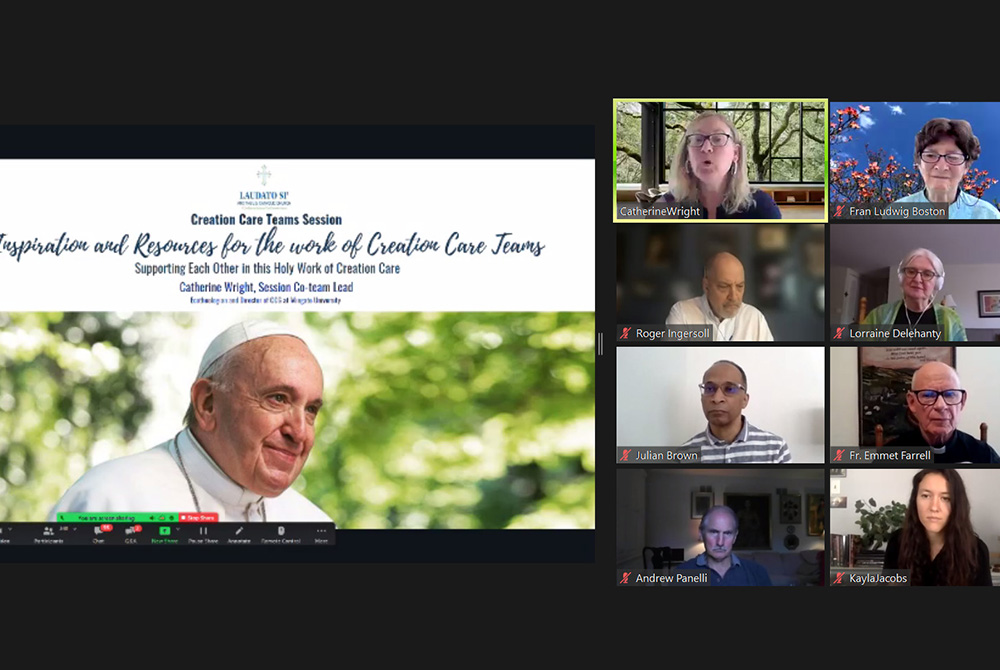
Members of the creation care team working group discuss ways to incorporate ecological education and action into parish life during a breakout session July 15 at the "Laudato Si' and the U.S. Catholic Church" conference. (NCR screenshot)
Nevertheless, presenters said, it is important not to let doubters hold up the work when scientists — and the Vatican — say there is no time to waste.
"We need to do the work and not wait for our leaders to lead us," said Patrick Barredo, director of social outreach and advocacy for St. James Cathedral in Seattle, who has helped form a grassroots creation care network in the archdiocese and wrote to Archbishop Paul Etienne asking that he launch a series of climate initiatives.
Toward the end of the conference, Delio was asked how she maintains hope amid increasing scenes of creation's destruction.
The Franciscan sister replied she tries to be mindful of her own actions — even picking up earthworms along walking paths to protect them, as St. Francis of Assisi did — believing in God's goodness, and celebrating life, even when things look dark.
"Truthfully, I think we need to lighten up. We need to laugh more," Delio said, before adding, "Yes, it is bad. I'm not saying it isn't. But it's not over. This is not an over-and-done universe. God is inviting us to wake up, to get up and to make something new together."








